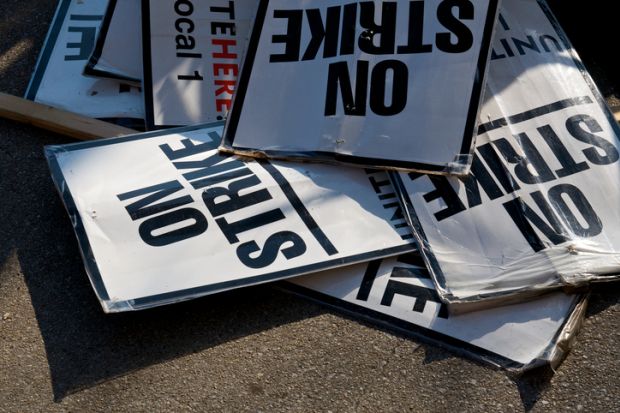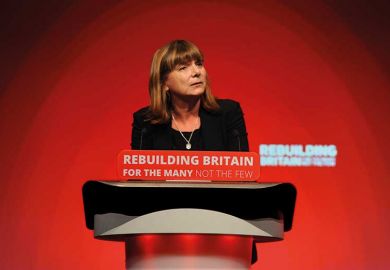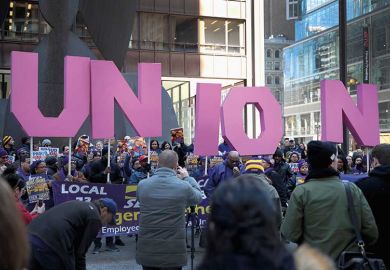More than two-thirds of union members who took part in a ballot have supported strike action over the pay offer to staff at UK universities, but on most campuses the turnout failed to hit the 50 per cent threshold required for walkouts.
Only at seven institutions did members of the University and College Union back strike action in a ballot with more than 50 per cent turnout, including the universities of Brighton, Huddersfield, Nottingham and Sheffield. Staff are also set to walk out at Heriot-Watt and Leeds Arts universities, as well as the Courtauld Institute of Art.
Nationally, 69 per cent of voting members backed the strike.
Staff at three providers in Northern Ireland, where the turnout threshold does not apply, also backed strike action: Queen’s University Belfast, Ulster University, and St Mary’s University College, Belfast.
Matt Waddup, the UCU’s head of policy and campaigns, said that members would be meeting in coming days to discuss the results of the ballot, in which 80 per cent of voters supported action short of a strike, and to decide on next steps.
“These national ballot results show clear support among members for action over pay,” Mr Waddup said. “However, pernicious restrictions on turnout that single out trade unions for special treatment mean this can only be taken forward in some institutions.”
The ballot was called over the offer from the University and Colleges Employers’ Association of a minimum pay rise for 2018-19 of 2 per cent, rising to 2.8 per cent for the lowest paid.
The vote had been seen as a test of the militancy of the UCU after its membership was swelled – and reenergised – by 14 days of strike action at 65 universities earlier this year in a separate dispute over reforms to pensions offered by the Universities Superannuation Scheme.
Speaking when the ballot was opened in June, the UCU said that Ucea’s offer would leave many staff with below-inflation rises and do nothing to address the falling value of higher education pay, which it says has declined in real terms by 21 per cent since 2010.
But the results indicate that the 50 per cent threshold for strike action, introduced by the government last year, represents a significant barrier to sector-wide walkouts.
Gregor Gall, a former professor of industrial relations at the University of Bradford who is now an affiliate research associate at the University of Glasgow, said that UCU activists who supported a strike had “quite spectacularly misjudged the mood of members”.
“To think that members viewed the issue of pay on a par with that of pensions was not only mistaken but also predictable before the ballot took place, given previous voting behaviour on pay,” Professor Gall said.
“Following on from this, the willingness of some employers to strengthen their resolve to resist the will of the UCU on many issues will have been strengthened. That will include pensions. This will be facilitated by many activists feeling demoralised at the result and blaming those who led the charge to ballot on strike action on pay.”
Roger Seifert, professor of human resource management at the University of Wolverhampton, took a different view, arguing that the result, “while not providing a green light for strike action across the board this time, shows across the sector both the level of discontent, and the level of support for strike action at a time when most workers in the public and private sectors are reluctant to take industrial action”.
“This appears to be a turning point for the sector, with industrial relations set to worsen as incompetent managers struggle with high levels of staff discontent, student wariness of what is on offer, and government inability to invest and plan for the future,” Professor Seifert said. “While this vote may not be the storm petrels of revolution, it is certainly a thunderclap that should awaken all sector leaders to the coming storm.”
Ucea had said that its offer would amount to an average pay rise of 3.5 per cent once incremental rises linked to seniority were considered. But unions had asked for a 7.5 per cent pay increase – or £1,500, whichever is greater – as well as a £10 minimum wage that would result in all higher education institutions becoming “living wage” employers.
A Ucea spokesman said that the number of yes votes counted was equivalent to “just 10 per cent of the total academic workforce covered in these national negotiations”.
“The insufficient turnouts when voting for strike action provide clear indications that the great majority of higher education staff understand the financial realities for their institution and accept the balanced and fair pay outcome implemented in April,” the spokesman said. “With extra increases for the lower paid and a 2 per cent base uplift for others – half of whom will also receive further increases through pay progression – it was clear that the higher education deal stacked up well against other sectors.”
Register to continue
Why register?
- Registration is free and only takes a moment
- Once registered, you can read 3 articles a month
- Sign up for our newsletter
Subscribe
Or subscribe for unlimited access to:
- Unlimited access to news, views, insights & reviews
- Digital editions
- Digital access to THE’s university and college rankings analysis
Already registered or a current subscriber?








